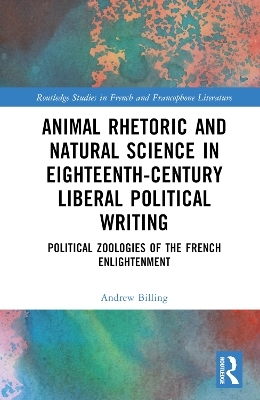
Animal Rhetoric and Natural Science in Eighteenth-Century Liberal Political Writing
Routledge (Verlag)
978-1-032-60572-2 (ISBN)
Our tendency to read French Enlightenment political writing from a narrow disciplinary perspective has obscured the hybrid character of political philosophy, rhetoric, and natural science in the period. As Michèle Duchet and others have shown, French Enlightenment thinkers developed a philosophical anthropology to support new political norms and models. This book explores how five important eighteenth-century French political authors—Rousseau, Diderot, La Mettrie, Quesnay, and Rétif de La Bretonne—also constructed a "political zoology" in their philosophical and literary writings informed by animal references drawn from Enlightenment natural history, science, and physiology. Drawing on theoretical work by Derrida, Latour, de Fontenay, and others, it shows how these five authors signed on to the old rhetorical tradition of animal comparisons in political philosophy, which they renewed via the findings and speculations of contemporary science. Engaging with recent scholarship on Enlightenment political thought, it also explores the links between their political zoologies and their family resemblance as "liberal" political thinkers.
Andrew Billing is an Associate Professor of French and Francophone Studies at Macalester College, Saint Paul, Minnesota, who specializes in French Enlightenment literature, philosophy, and political thought. He completed his doctorate on Rousseau's political writings at the University of California, Irvine. He has articles published and forthcoming on Rousseau, Quesnay, Louis-Sébastien Mercier, Diderot, and other early modern French political authors, and co-edited a special volume of L'Esprit Créateur on Paris, capitalism and modernity with Juliette Cherbuliez.
Acknowledgments
French Enlightenment Political Zoology: A Definition
“Political Zoology” as a Hybrid Science
Disenchanting the Animal in French Enlightenment Political Rhetoric
Enlightenment Anthropology and New Theories of animalité
Empiricist Natural Science and the Critique of Political Absolutism
An Emergent Eighteenth-Century French Liberalism
1 La Mettrie’s Hybrid Medical and Political Science
This Bold Analogy: La Mettrie, Descartes, and the Vicissitudes of the Animal-Machine Figure
Machine Rhetoric and the Animal Economy in L’Homme Machine
The Animal in La Mettrie’s Anthropological Machine
The Moral Sentiments, Natural Law, and the“Prerogatives of Animality”
The Animal-Machine as Moral Image in the Discours sur le bonheur
The Limits of La Mettrie’s Liberalism: The Philosopher, the Sovereign, and the People in the Discours préliminaire
2 Political Economy as an Animal Economy in François Quesnay
General and Particular Economics and the “great law of the natural order"
Theorizing the Animal Economy in the Essai physique sur l’économie animale
Animals, Representation, and Nature in Quesnay’s Political Economy
Quesnay’s “Liberal Despotism”: The Animal and the économie morale
3 The Animal in Question in Diderot’s Moral and Political Philosophy
Thinking Politics in an Animal Laboratory
Diderot’s Bee: Morality, Politics, and the Interpretation of Nature
Animal and Human Morality in Diderot’s Encylopédie Essays
Beyond the Human: Diderot’s Éléments de physiologie
Animality, Anarchism, and The Nature of Happiness
4 Political Anthropology and Its Animal Other in Rousseau
Animal Origins and Human Foundations in the Discours sur l’inégalité
Liberty, Equality, and Human Specificity
Rousseau’s Moral Sentiments: Pity, “Love of Oneself,” and the “Ferocious Beast”
The Disappearance of the Compassionate Animal in Emile and the Essai sur l’origine des langues
Rousseau’s Primitivism: Ferocity as Amour de soi
5 Animality, Race, and “Liberal Empire” in Rétif de La Bretonne
Rétif’s Real and Perfect Republic: Liberalism Between Absolutism and Communism
Rétif’s Imperial Zoology: The Animal as Predator and Racialized Other
A Politics Beyond the Predator/Prey Distinction?
Patagonia and Megapatagonia Rétif’s Imperial Desire: Promissory Liberalism and “Unequal Fraternity”
“The inconceivable Animal-human”: Animality, Race, and métissage in the Lettre d’un singe aux êtres de son espèce
Conclusion
Index
| Erscheinungsdatum | 12.12.2023 |
|---|---|
| Reihe/Serie | Routledge Studies in French and Francophone Literature |
| Zusatzinfo | 4 Halftones, black and white; 4 Illustrations, black and white |
| Verlagsort | London |
| Sprache | englisch |
| Maße | 152 x 229 mm |
| Gewicht | 680 g |
| Themenwelt | Geisteswissenschaften ► Sprach- / Literaturwissenschaft ► Anglistik / Amerikanistik |
| Geisteswissenschaften ► Sprach- / Literaturwissenschaft ► Literaturwissenschaft | |
| Naturwissenschaften ► Biologie ► Zoologie | |
| Sozialwissenschaften ► Politik / Verwaltung ► Politische Theorie | |
| Sozialwissenschaften ► Soziologie | |
| Weitere Fachgebiete ► Land- / Forstwirtschaft / Fischerei | |
| ISBN-10 | 1-032-60572-3 / 1032605723 |
| ISBN-13 | 978-1-032-60572-2 / 9781032605722 |
| Zustand | Neuware |
| Informationen gemäß Produktsicherheitsverordnung (GPSR) | |
| Haben Sie eine Frage zum Produkt? |
aus dem Bereich


